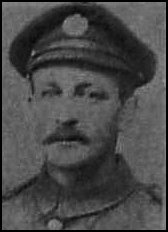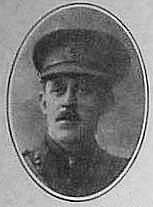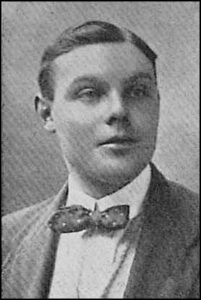During the Battle of Hill 60, the 20th April 1915 was probably the day when Bexhill suffered its greatest loss of life in one action. Six were killed and one, possibly four more, later succumbed to their wounds. Three other Bexhillians were known to have been wounded.
These are the words of some of the Bexhill Men who participated:
 Sapper W Simmons writes to his wife at 32 Cambridge Road;
Sapper W Simmons writes to his wife at 32 Cambridge Road;
“We went through with an attack the other day and we only had a few casualties and a few more the next day, but yesterday was a day I shall never forget. We had a couple of shells dropped into where we were billeted, killing three outright and wounded. I don’t know how many. Some of the wounded have since died. Bill Morley was wounded. Young George Morris from Sidley was killed instantly; Vincett of Bexhill is dead. I have just heard whilst I am writing this that there has been, as far as we can find out, 31 casualties, including eight dead. Ward Britt is wounded; Alf Freeman is all right, for he was away from the place when the job occurred, and I might tell you that it was a clear out for our lives. I forget which day it was … We have had but little sleep since last Tuesday, but we are hoping to get a better night to-night, though of course, we never know when we might get a call. We should all like to be sent back a few miles for a little rest if only for a week … We have two missing who have not been seen since Tuesday … Cowslips are very plentiful out here. They look very nice growing wild. I would like to send home a nice handful, or better still, I would like to bring them myself.”
Sapper Turner writes to his wife at 55 Sidley Street;
“No doubt you will have heard of our awful bad luck, and extra bad so far as Bexhill is concerned, but I am to say I just missed being hit by the shells, but was very close, so I must think myself very lucky indeed. We have had an awful week of it, and do not wish to see another like it. You will see that poor George Morris was among the killed as well as other Bexhill chaps.”
Corporal Ernest William Eldridge writes to his mother at Little Common Road;
“I am sorry to say we have lost some of our chaps, but I cannot say how many. I expect you will have heard by the time you receive this. I must be very thankful myself though I got a bruised back and general shaking up. I have been sent down here for a rest, which I think I have earned. We have had a good few wounded, but how many I cannot say, as I have not seen any of our chaps I have known. I believe Filmer and Morris are killed, and a corporal in our section from St Leonards. Don’t worry for me. I cannot get better attention than I am getting here. They are English nurses and they are very kind, and the doctor as well. We get good food, and what is more, a nice comfortable bed to lie upon. We are having lovely weather, and now we are in the country, and everything we could wish for, so I am going on well.”
 Captain Ticehurst Commanding Officer 2nd Home Counties Field Company Royal Engineers writes;
Captain Ticehurst Commanding Officer 2nd Home Counties Field Company Royal Engineers writes;
“I really have had no time to write. Two days and two nights I had of it in the trenches, and it was a bit hot, I can assure you. We only had six casualties. Lieut Sidebotham had a bullet in his arm, and others were wounded by shells. But unfortunately we had a worse calamity. A couple of shells came into the barracks were our men were billeted, and killed eight and wounded 35. Then after we had moved them away and found some work to occupy their minds, another shell came and wounded 13 more, so my Company is at present very small. I had a lot of preparations to make for the show of the 17th and should like to tell you all about it. The Germans use shells that give off a dense black-blue smoke, smelling something like petrol and creosote mixed. It makes your eyes and nose run something awful. The last day or two they have been dropping some very heavy stuff in the town. We had to move out very quick. A large shell came and absolutely demolished a house two doors away. We were just having some grub when we heard it whistling overhead or rather towards our heads. Then a tremendous crash, and our house shook something awful. Several poor beggars were killed. We cleared out as soon as we could, as the top part of our house came down, and we had to bivouac out in a field. It was awfully cold. We had two nights of this, and then found a farm, so shall get a good night’s rest to-night, I hope. None of us has had one for a week.”
Sapper Taylor writes to his mother at Cumberland Road;
“It was something terrible. We came through with only three slightly wounded. But we had the misfortune to get shelled out of our billets. That was where Ward [Britt] was wounded, but not serious. I expect he is in home in England now. Poor George Morris was killed there and several more. He did not suffer any pain. It is a marvel how Joe Clifton, Bill Simmonds and myself did not get hit. That same afternoon we were out with a working party, when a shell hit the very house we were working by. There were several hit. Ernie Noakes had a shaking up, but a day or two will get him fit again. The two I mentioned, with myself, got a sprinkling of dust. We have got back from the firing line now, so there is no need to worry about me. I am in the best of health myself. Tell Mrs Britt not to worry about Ward. We are having lovely weather now.”
 Driver Stanley B Philp 2nd Home Counties Field Company Royal Engineers writes;
Driver Stanley B Philp 2nd Home Counties Field Company Royal Engineers writes;
“I am sorry to say we have lost several good men and have many wounded. Young Jack Vincett was killed by a shell on Tuesday, and it also did for poor old Ned Filmer [who worked in Devonshire Dairy]. I think these are the only Bexhill men you would know, although there are several wounded.”

